
NEWSLETTER ICC NL Q1-2024
Welcome to the latest issue of the ICC Netherlands quarterly newsletter!

I am happy to tell you that the content that we have compiled for this issue represents exactly what we are aiming to achieve with this newsletter: to give you – our members – the broadest possible perspective of news from the international business community and the ICC.
Here’s a brief summary of what you can find in this issue:
• The Global Chair of the ICC, Maria Fernanda Garza, found time in her busy schedule to answer a range of questions from global megatrends to the Netherlands’ position in the worldwide trade environment.
• An update from the Global ICC Environment Commission: working towards plastic circularity, strengthening financial support for climate adaptation, and identifying the link between CSDDD reporting and biodiversity.
• The Secretary General of ICC United Kingdom, Chris Southworth, talks about the benefits of switching from paper-based trading documents to digital. The UK passed this milestone at the end of 2023 and the positive results were seen practically overnight. Dutch businesses still have a long way to go….
• Marjo van den Broek and Manon de Zwart from Rabobank give us the lowdown on ‘Diversity of Thinking’ and ‘Employee Voice’.
• Using Mediation as an alternative to Dispute Resolution. “Unlike litigation or arbitration, mediation offers a collaborative approach, guided by an impartial mediator who facilitates dialogue between conflicting parties.”
• The five takeaways from MC13: improving market access, a vision of WTO reform, thriving digital trade, roadmap to trade and environmental sustainability, and accelerating the WTO’s Trade Facilitation Agreement.
As you will notice, this newsletter covers various aspects of international trade. This comprehensive approach reflects ICC Netherlands’ role and commitment as the Dutch branch of ICC Global, ensuring that Dutch businesses are effectively represented on the global stage.
Laure Jacquier Director ICC Netherlands
www.iccwbo.nl
CONTENTS 4 4 6 8 8 10 12 12 12 13 14 16 16 17 18 20 20 21 22 22 23 25 26 27 27 HIGHLIGHTS ON INTERNATIONAL TRADE A word with ICC global Chair Maria Fernanda The 13th Ministerial Conference of the WTO DISPUTE RESOLUTION Mediation of International Commercial Disputes VU Amsterdam’s Triumph at ICC Mediation Competition SUSTAINABILITY Output of the Global ICC Environment Commission ICC working group on plastic pollution COP 29: A Pivotal Moment for Climate Action COP 16: A Call to Action for Global Biodiversity Conservation ADVERTISING AND MARKETING COMMUNICATIONS Use of AI in Advertising and Marketing Communications Green claims in Advertising and Marketing Communications INTRODUCING THE NEW ICC NETHERLANDS WEBSITE! GLOBAL ALLIANCE FOR TRADE FACILITATION Annual report 2023 Unlocking borders and empowering growth in the Dutch Agri-food sector DIGITALIZATION OF TRADE ICC Digital Standards Initiative program in the Netherlands UK trade has gone digital. What now for the Netherlands? Don’t miss the annual C4DTI Digital Conference and Awards! WEEK OF INTEGRITY The 2024th Edition ICC activities for the Week of Integrity Interview with partners Rabobank 28
Highlights on International Trade Q1 & outlook 2024

A word with ICC global Chair Maria Fernanda
Maria Fernanda Garza, the Global Chair of the ICC, recently visited the Netherlands. She found some space in her busy schedule to answer a few of our questions.

The ICC’s role is so much broader than just ‘promoting international trade’. How much of a challenge is it for you to get the complete message across?
This is a huge challenge for us to communicate this properly around the world. Besides our headquarters in Paris, we have a presence in 170 countries – if fact, after the United Nations and the Red Cross, we are the largest active international organisation. Within this network, we are involved in so many different subjects: integrity, corruption, climate change, intellectual property, for example. The ICC also contains the International Court of Arbitration, which provides world-leading dispute resolution services.
And how are all these subjects organised?
These are established within our policy commissions. The commissions can be seen as specialised thinktanks which develop position papers on global topics. We have both global commissions and national commissions, which are closely connected. Experts in each country participate in national commissions, taking into consideration the values and principles of the ICC on that particular topic at the local level, but they also maintain a close contact and participate in the global discussions. The commissions are at the heart of what we do: this is where world experts meet to address global challenges.
How many commissions are there?
There are twelve global commissions working on a diverse range of subjects: from competition to taxation, from customs to marketing. The commissions are very effective: the ICC was the first organisation to start talking about double taxation 40 years ago. A few years ago we issued guidelines for the marketing of alcoholic drinks. And right now we are working on guidelines and rules to prevent greenwashing in advertising.
4
The full list of the ICC’s twelve global commissions:
• Arbitration and ADR
• Banking
• Commercial Law and Practice (CLP)
• Competition
• Corporate Responsibility and Anti-corruption
• Customs and Trade Facilitation
• Digital Economy
• Environment and Energy
• Intellectual Property
• Marketing and Advertising
• Taxation
• Trade and Investment Policy
What do you say to people who think the ICC is only relevant for large multinational companies?
The ICC has three integral internal bodies: the International Court of Arbitration, the Institute of World Business Law, and the World Chambers Federation. And it is this third body – the World Chambers Federation – that is relevant to small and medium-sized businesses. It comprises the global network of Chambers of Commerce and is therefore in close contact with SMEs. SMEs around the world are the most significant creators of jobs; we work with them because this is the best way to understand the real economy. And to make sure that the policies that are being implemented globally take the SMEs into consideration.
What benefits does ICC membership offer a company?
ICC membership keeps companies close to international trade developments. For example, ICC Netherlands provides its members with all the insights of what is going on internationally. With this information, members can fine-tune their dialogue to ensure that they are operating in an ‘international’ way. Moreover, for many companies, ICC membership is part of their risk management and strategic planning. For example, whatever is being discussed globally is going to have an impact locally. So with information about global policy, companies can start planning ahead for the future. ICC membership also involves two-way communication; members that participate in the global and local commissions can express their points of view. Participation gets your voice heard. This means that their needs are taken into consideration during global policy making.
What do you think about the Netherlands’ position in the global trade environment?
If I look at the history of the Netherlands and the impact that this country has had on global trade, it is amazing. And then if I look at the knowledge that this country has accumulated, I truly believe that the potential of what the Netherlands could bring to the current trade environment has not been fully taken advantage of. My experience of working with Dutch companies and organisations has taught me two main things. First: that they are always looking to increase efficiency. And second: that they want to share their knowledge with other countries. Therefore, I say that the international trade community needs the Dutch business community to be more participant in the world arena. We need everybody to come to the table and work together to address the huge challenges that we have in front of us.
What megatrends do you see influencing global trade the most in the next 10-20 years?
First of all, we have to think longer than a 10 or 20 year timeframe. I believe that the actions that we take today are going to have a huge impact on the world 50 years from now. Obviously digitalisation is one of the megatrends; we are very much digitalised in our daily lives. This is a big subject, including artificial intelligence and quantum computers, which itself represents a huge change. Another very important global discussion that we are working on right now – one that will have a lasting impact – is about transforming the plastic industry into a circular economy. It is amazing to see that it is the business community that is putting pressure on governments to take action on this. And while climate change is an extremely important megatrend, I want to highlight the importance of biodiversity, which is a connected, but totally different issue to climate change. Sustaining the biodiversity of the planet is of absolute importance. However, with so many other problems arising, we tend to forget about it. The ICC tries to stay on top of all of these issues, trying to expand the vision of the international business community to address them and include them in ongoing agendas.
And one last question. Have you enjoyed your visit to the Netherlands?
I have a particular love for the Netherlands. I have been here many times and I have very good friends here. I really like the people here; I like their openness, directness and warmth. I also love the respect for the rule of law here; everybody is very respectful for each other. This is something I truly appreciate.
5
A disappointing 13th Ministerial Conference
With the challenges posed by upcoming elections around the world, the timing of MC13 in February 2024 may not have been ideal, potentially impacting attendance and ambitions. But looking back on the 13th Ministerial Conference held in Abu Dhabi last February, we must conclude that uncertainties loom over the WTO.
What is the WTO?
The World Trade Organization (WTO) came into being in 1995. One of the youngest of the multilateral organizations, the WTO is the successor to the General Agreement on Tariffs and Trade (GATT) established in the wake of the Second World War. Its main function is to provide a forum for member governments to negotiate trade agreements, resolve trade disputes and ensure that trade flows as smoothly, predictably and freely as possible. The WTO is run by its member governments. All major decisions are made by the membership as a whole, either by ministers (who meet at least once every two years at the Ministerial Conference – MC) or by their ambassadors or delegates (who meet regularly in Geneva). Decisions are made by consensus, which is important for ensuring that the interests of all members are taken into account. However, in recent years, some members have used consensus as an instrument of veto, blocking multilateral outcomes and creating a challenge to the effective functioning of the organization.
At MC13, Comoros and Timor-Leste were approved as new WTO member states, which will bring the total membership of the organization to 166.
What is MC13?
MC13 was the WTO’s thirteenth Ministerial Conference. The Ministerial Conference is the highest decision-making body of the WTO. Ministerials take place around every two years and take decisions on various trade issues. ICC played a prominent upstream role in MC13, ensuring that member states were well informed about the challenges facing the global business community. We organized the very successful official MC13 Business Forum with the WTO and conducted regular briefings with our members to ensure alignment on strategic topics and priorities (before and during MC13).
Join us on June 20th as the ICC Global Commission on Customs and Trade Facilitation convenes in the Netherlands. Engage in discussions with international experts as we explore the future of trade and customs facilitation.
Although the cautious extension of the Moratorium on customs duties on electronic transmissions (“E-Commerce Moratorium”) and the recommitment to having a fully and well-functioning WTO dispute settlement system by the end of 2024 are positive steps, governments fell short in making the necessary compromises to facilitate trade- and welfare-enhancing agreements.
In a world grappling with rising protectionism and geopolitical tensions, the World Trade Organization (WTO) remains a crucial platform for establishing modern trade rules, promoting transparency in trade actions, and resolving trade disputes among Member States. But the WTO needs to evolve. At the close of the official MC13 Business Forum, which was co-organized by ICC and the WTO during the conference, ICC Secretary John Denton and Chair Maria Fernanda Garza presented to WTO Director-General Ngozi Okonjo-Iweala and MC13 Chair H.E. Dr Thani bin Ahmed Al Zeyoudi five key priorities for the global business community: putting market access back on the agenda of WTO members, agreeing on a holistic vision for WTO reform, allowing digital trade to thrive, establishing a formal roadmap to address specific issues on trade and environmental sustainability, and accelerating the full implementation of the WTO’s Trade Facilitation Agreement.
6
Looking ahead, the extension of the E-Commerce Moratorium at MC13, which has enabled digital trade to flourish since 1998 and prevented the imposition of burdensome tariffs and non-tariff barriers, can be considered a success. However, it is concerning that the MC13 ministerial decision included for the first time an explicit sunset provision rather than the explicit possibility for renewal. While ministers remain free to amend their decision and further extend the E-Commerce Moratorium, without such a decision, it will expire on the next ministerial conference (MC14) or 31 March 2026, whichever is earlier. The Dutch government has expressed its concern: in a world where digitalization is increasingly important, it is crucial to ensure the prevention of the imposition of customs duties on electronic transmissions.
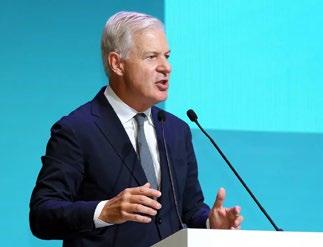
The Dutch position
This was always going to be a challenging ministerial given prevailing geopolitical frictions and the sheer number of countries going to the ballot box in the coming months. The unexpected weakness of the overall package should, however, serve as a wakeup call on the need for a more nuanced and constructive debate on the role of trade in society – both locally and globally. No country stands to gain from a weakened multilateral trading system.
John W.H. Denton AO, ICC Secretary General
The Netherlands ranks fourth globally in the export of goods and eighth in the export of services. Every Dutch company operating internationally benefits from the clear and reliable frameworks provided by the global trade system, with the WTO at its core. Therefore, it is vital to continue to advocate for strengthening the global rules-based trading system.
The outcomes from MC13 were very limited but include:
• An extension of the moratorium on tariffs on electronic transmissions (“E-Commerce Moratorium”)
• A recommitment to have a fully functioning WTO dispute settlement system by the end of 2024.
Unfortunately, MC13 did not produce any agreements on a followup accord to combat harmful fisheries subsidies, trade and state interventions for industrial sectors, or an agricultural work program. It was not possible to bridge the differences between WTO members on these issues during MC13.
The way forward
The Business Forum , co-organized by the International Chamber of Commerce (ICC) and the World Trade Organization (WTO), took place on February 28 at the Abu Dhabi National Exhibition Centre (ADNEC) as part of the WTO’s 13th Ministerial Conference (MC13). Speakers from both the private and public sectors worldwide shared their insights on key challenges faced by the WTO.
Access the full recording of the MC13 business forum here.
We are encouraged by the two-year extension of the Moratorium, although its renewal will undoubtedly be an uphill battle. ICC is now analyzing the outcomes of MC13 and devising a path forward, particularly concerning the E-Commerce Moratorium and digital trade.
ICC is continuing to advocate strongly for multilateral solutions to trade frictions and is working closely with the WTO and member states to advance discussions and pave the way for more ambitious outcomes in priority areas for global business by the next ministerial conference, including in the areas of digital trade, sustainability & trade, and WTO reform.
7
Dispute resolution

Mediation of International Commercial Disputes
The New York Convention on the Recognition and Enforcement of Foreign Arbitral Awards, commonly referred to as the New York Convention, is a landmark international treaty in the field of arbitration. Adopted in 1958 and entering into force in 1959, the Convention aims to facilitate the recognition and enforcement of arbitral awards rendered in one contracting state in other member states.
This significantly enhances the enforceability and finality of arbitral awards on a global scale, thereby promoting international trade and investment by providing parties with a reliable mechanism for resolving disputes outside national courts.
The Convention sets forth specific conditions under which the recognition and enforcement of arbitral awards may be refused, such as incapacity of parties, invalidity of the arbitration agreement, or public policy concerns. However, such grounds for refusal are narrowly construed to ensure the effectiveness of the Convention’s objectives.
Today, the New York Convention boasts nearly 170 member states, making it one of the most widely ratified treaties in the field of international law. Its universal acceptance underscores its indispensable role in fostering a harmonized and predictable framework for the enforcement of arbitral awards worldwide.
In our modern world, disputes often find their way into courtrooms, but the limitations of this traditional approach are becoming increasingly evident. Court decisions typically offer only national coverage, making enforcement across borders a complex and arduous process. Alternative Dispute Resolution (ADR) offers a solution for international businesses.
Since the inception of the New York Convention, mechanisms have been introduced to ensure Arbitration decisions (the best known form of ADR) can be enforced across different countries. With over 100 years of experience in Dispute Resolution, ICC has been at the forefront of this evolution. ICC arbitration offers a proven, reliable, and enforceable solution for resolving disputes globally. But arbitration is not the sole way of Alternative Dispute Resolution.
One such method gaining momentum is mediation. Unlike litigation or arbitration, mediation offers a collaborative approach, guided by an impartial mediator who facilitates dialogue between conflicting parties. Originating in the Anglo-Saxon world, mediation has steadily gained traction worldwide over the past four decades. While its informal nature allows for flexibility, the absence of legal regulation has led to a diverse range of mediation styles. In countries like the Netherlands, where the mediation market is unregulated, membership in recognized professional organizations such as the Mediator federatie NL (MfN) ensures quality and professionalism.
Embracing the evolving landscape of dispute resolution, ICC has adopted mediation as a valuable alternative to traditional methods. Through initiatives like the “mediation window” in arbitration cases, ICC aims to integrate mediation into the fabric of international dispute resolution. By providing parties with access to mediation at various stages of the arbitration process, ICC seeks to enhance efficiency and reduce costs; providing the best alternative to the parties involved. Proposals for confidential mediation facilitators in the starting phase of an Arbitration process offer a glimpse into the future of dispute resolution, promising expedited and cost-effective outcomes.
The mediation process is straightforward yet effective. If mediation can be used, it should be; unless you’re 100% sure you will get what you want from an arbitration or legal proceeding.
Why Choose Mediation?
Mediation takes considerably less time and costs much less than litigation or arbitration. Where litigation and arbitration may take years, mediation is a matter of months. It offers a confidential and impartial platform for resolving disputes, making it the preferred alternative in many cases. Unlike litigation or arbitration, mediation allows parties to negotiate and reach a settlement in a private,
8

It is amazing to see how parties who really disagree can reach a settlement in a one-day mediation session. What I love about international mediation is to get two parties from different countries and very often different cultures to get on speaking terms and to see them realize that they are better off with a good negotiated settlement, than with continued fighting in court or in arbitration.
Bart Neervoort, ICC Mediator based in Amsterdam
confidential and collaborative setting. With a mediator facilitating discussions, parties have the freedom to explore creative solutions that address their underlying interests and concerns.
Moreover, mediation results are binding, akin to any formal agreement. The Singapore Convention, signed by numerous countries, ensures the enforceability of mediation decisions, providing parties with added assurance of compliance. While EU countries have yet to ratify this convention, the growing recognition of mediation’s effectiveness is driving momentum towards its universal acceptance.
The future of Mediation: Mediation Competition
Organized each year, in February, in Paris, the ICC Mediation Competition is one of the biggest educational competitions worldwide dedicated exclusively to international commercial mediation. It gathers 350+ students and coaches, as well as 150+ professional mediators, academics from across the world and numerous volunteers, sponsors and observers.
This year, The Law Society of Ireland team took first place in the 19th ICC International Commercial Mediation Competition, defeating a team from Germany’s University of Marburg during the final mediation session.
Vrije Universiteit Amsterdam from The Netherlands took the third place.
Read more here
How Does Mediation Work?
Participation in mediation is voluntary, requiring mutual agreement from all parties involved. Upon initiating the process, parties may apply for mediation administration, typically through platforms like the ICC ADR website. If necessary, ICC can propose a mediator, ensuring impartiality and expertise in facilitating the mediation process.
One notable advantage of mediation is its adaptability to online platforms, offering convenience and cost-saving benefits. Formalities, including confidentiality agreements and procedural details, are agreed upon by the parties before starting out. Usually each party submits a mediation brief that outlines their issues, paving the way for constructive dialogue during mediation sessions.
The mediator’s role is pivotal in guiding discussions and fostering a collaborative atmosphere. Through joint and private sessions and open dialogue during the day, the mediator seeks to uncover common ground and facilitate mutual understanding between the parties. With an impressive success rate of 85-90%, mediation often leads to mutually beneficial settlements, even in emotionally charged disputes.
While legal representation is optional, attorneys with expertise in mediation can provide valuable insights and support throughout the process. Their focus on problem-solving and cooperation ensures that both parties actively engage in finding a resolution that meets their needs.
In essence, mediation offers a flexible and effective means of resolving disputes, empowering parties to find mutually acceptable solutions while preserving relationships and minimizing costs. As awareness of its benefits continues to grow, mediation is poised to play an increasingly integral role in the global landscape of conflict resolution. Mediation can either be agreed upon by including a mediation clause or a combined mediation arbitration clause in their contract or separately once the dispute has arisen.
Example of s combined ICC mediation arbitration clause
In the event of any dispute arising out of or in connection with the present contract, the parties shall first refer the dispute to proceedings under the ICC Mediation Rules. If the dispute has not been settled pursuant to the said Rules within 45 days following the filing of a Request for Mediation or within such other period as the parties may agree in writing, such dispute shall thereafter be finally settled under the Rules of Arbitration of the International Chamber of Commerce by one or more arbitrators appointed in accordance with the said Rules of Arbitration.
Stay tuned for our upcoming webinar on mediation as alternative for dispute resolution! Join us as we delve deeper into how mediation works for businesses, with the opportunity to ask specific questions.
9
VU Amsterdam’s Triumph at ICC Mediation Competition
This past February, a team of dedicated students from VU Amsterdam, in partnership with De Brauw Blackstone Westbroek, showcased their remarkable talents at the 19th edition of the ICC International Commercial Mediation Competition. Comprised of Tonya Baranov, Ilay Beeldsnijder, Sem van der Wel, and under the guidance of coach Ewout Goudsmedt, the team achieved an outstanding third place in the semi-finals, competing against some of the most seasoned teams from around the globe.
Reflecting on their journey, the team shared, “The competition was a whirlwind of emotions, hard work, and invaluable learning. Each day brought its challenges, yet the experience was enriched with laughter, new friendships, and an abundance of knowledge . Our success was not just in the competition, but in the profound skills and connections we gained.” The essence of their journey is rooted in the art of mediation – striving for a resolution that benefits all.
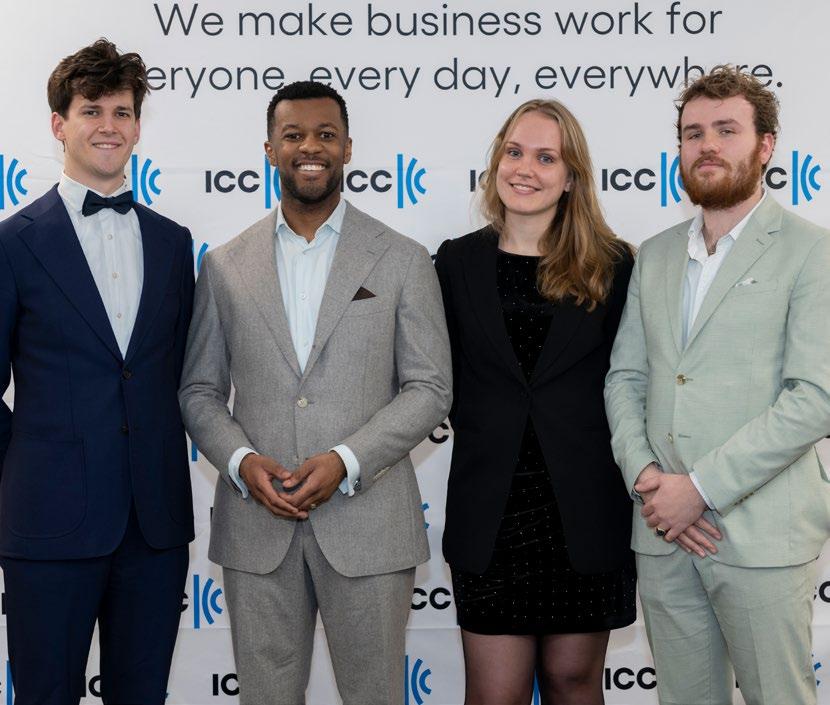
10
“Throughout this journey, we all learned a lot – and in our own way and style. During all the sessions we came to understand that winning in mediation is different. True success in mediation transcends the notion of winning against an opponent. It’s about facilitating a process where everyone gains, and feels better off than where they started. It takes great skill, and thus never-ending practice. And it is those skills that we will be taking with us for the rest of our lives.”
Special acknowledgment was given to coach Ewout Goudsmedt, whose dedication and leadership were pivotal throughout the preparation and competition phases. “Ewout’s commitment was the cornerstone of our team’s strength and unity. His expertise and skill on the one hand, and his relentless support and guidance on the other hand, were instrumental in our journey,” the team expressed.
The journey doesn’t end here. The team is excited to mentor a new group of VU students for the upcoming Centrum voor Conflicthantering Business Mediation competition. This initiative is a testament to their dedication to fostering the next generation of mediators.
For graduating law students seeking a transformative experience or professionals eager to contribute to this dynamic field, the team encourages reaching out. Their journey is a beacon for those aspiring to excel in mediation and dispute resolution.
This success story is not just about a competition; it’s a narrative of growth, learning, and the unyielding spirit of collaboration. We are proud of our team’s achievements and look forward to their continued contributions to the field of mediation.
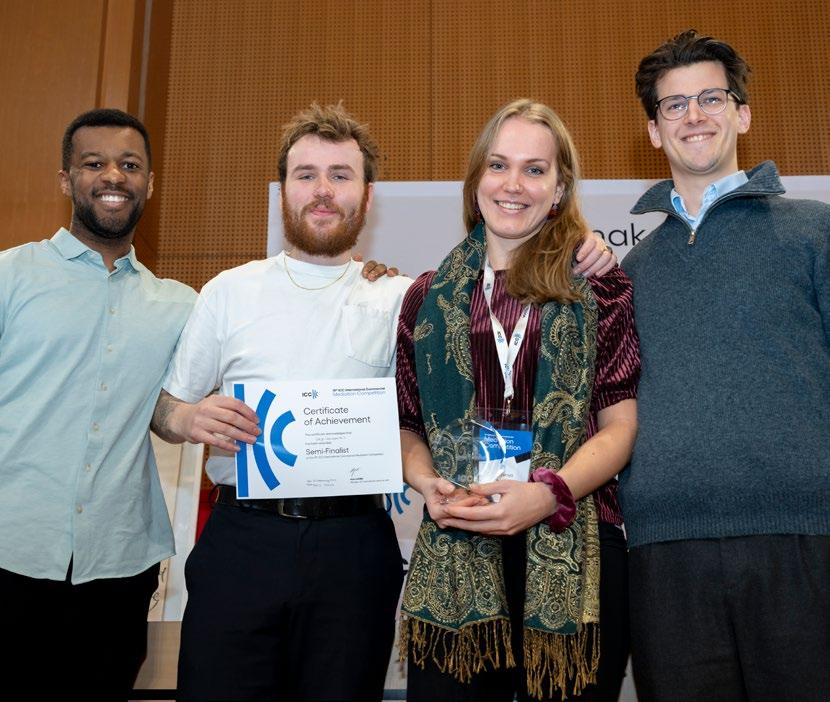
11
Sustainability

Output of the Global ICC Environment Commission
The Global Commission was a full day of engaging conversations and presentations on various environmental topics, ranging from plastic pollution to climate change mitigation. With the ICC’s commitment to ensuring that the business community’s perspective is heard, the commission is gearing up for some key milestones this year.
What is INC?
The Intergovernmental Negotiating Committee (INC) was established by the United Nations Environmental Assembly (UNEA) to develop an international legally binding instrument on plastic pollution, including in the marine environment. The first meeting (INC-1) was held in the week of 28th of November 2022 with the ambition of completing its work by the end of 2024. INC-4 will be held in April 2024 in Canada.
ICC working group on plastic pollution
ICC’s Working Group on Plastic Pollution is fully committed to supporting the INC (Intergovernmental Negotiating Committee) Secretariat and Member States in their efforts to achieve an ambitious, effective and feasible internationally legally binding instrument (ILBI) by 2024. This instrument aims to mobilize all stakeholders – governments, businesses, and civil society – in the collective mission to combat plastic pollution and set the framework for accelerated business action.
The release of the Zero Draft represents a significant step towards developing a legally binding instrument that addresses the entire lifecycle of plastics. It encompasses aspects such as product design, materials and transitioning to a fully circular economy for plastics. Additionally, it emphasizes the importance of enhanced international collaboration in areas such as finance, technology access, capacity building and scientific cooperation.
The current fragmentation of regulations surrounding plastic production and pollution poses challenges for international trade. Therefore, achieving unity in regulatory approaches would greatly benefit businesses. The comprehensive approach to the plastic lifecycle outlined in the legally binding document presents both political and technical challenges, but also opportunities for the adoption of modern and effective technologies that consider the complexity of plastic’s lifecycle.
The plastic lifecycle intersects with the triple planetary crisis: climate change, pollution and biodiversity loss. The discussions around plastic lifecycle includes marine litter and its impact on biodiversity and the use of chemicals in polymers. There is consensus on the need to address all these issues and a recognition that a circularity approach is crucial but not self-sufficient. A more challenging subject is plastic production, where business as usual is no longer tenable but alternatives are lacking. While INC 3 saw agreement on modalities and output but not on content, we hope INC 4 will focus on realistic options to reach a consensus and make concessions at this critical juncture.
Businesses can contribute by showcasing available options, building capacity, and raising awareness. This is particularly relevant when tackling waste management in developing countries where urgency and opportunities must be understood by younger generations.
The financial flows will need alignment to ensure implementation, likely through mechanisms such as extended producer responsibility and clear manufacturing rules. ICC’s position advocates for a robust treaty, emphasizing circular principles, consistent global rules, conducive investment conditions, stakeholder engagement, and capacity building for SMEs. This is crucial considering that 90% of local businesses are SMEs.
12
COP 29: A Pivotal Moment for
Climate Action
The global community finds itself at a critical juncture in the fight against climate change, with COP 28 and COP 29 representing pivotal moments in shaping the trajectory of climate action.
The global community finds itself at a critical juncture in the fight against climate change, with COP 28 and COP 29 representing pivotal moments in shaping the trajectory of climate action.
At COP 28, the establishment of the loss and damage fund underscored a significant shift towards global solidarity in addressing climate challenges. Over 130 countries have endorsed the energy declaration, and 150 countries have pledged support for the health declaration. This reflects the widespread international commitment to combating climate change. However, the key to success lies in implementation and delivering on promises.
Initiatives from COP 28 include the formulation of an operational funding agreement. This is essential for establishing a framework and allocation system, with the World Bank retaining oversight of funds. Additionally, efforts are underway to develop a comprehensive framework for enhancing climate resilience.
Looking ahead to COP 29, there is a pressing need for strong commitments to Nationally Determined Contributions (NDCs), due by February 2025 latest, with a focus on implementing those roadmaps. Anticipated announcements on decarbonizing the shipping sector by the International Maritime Organization (IMO) and the leadership role of G20 nations, representing 80% of global greenhouse gas emissions, are also crucial.
Addressing critical challenges requires a collective approach to finance, with a focus on strengthening financial support for climate adaptation and addressing loss and damage. Clear definitions of climate finance and harmonized reporting standards are essential for progress.
Advancements in the carbon market are imperative, urging larger economies to play a more active role to ensure environmental integrity and uphold human rights.
Looking ahead to future COPs, there is a need to clarify objectives and emphasize the relevance of the COP conferences, particularly their link to businesses. Despite electoral and global instability, the COP process remains ongoing, with increasing pressure for business engagement.
ICC is actively engaging for COP 29, focusing on securing strong outcomes for NDCs, addressing Article 6 challenges, and facilitating dialogue between the private and public sectors.
COP 29 represents a critical moment in the global effort to combat climate change. With concerted international cooperation and decisive action, there is hope for meaningful progress towards a sustainable future.
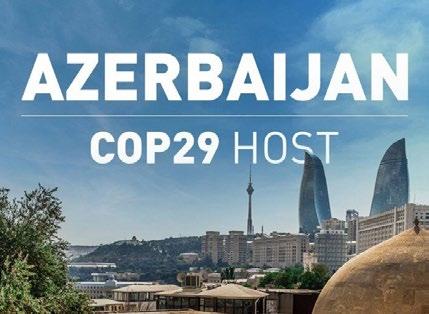
Nationally Determined Contributions, or NDCs, are countries’ self-defined national climate pledges under the Paris Agreement, detailing what they will do to help meet the global goal to pursue 1.5°C, adapt to climate impacts and ensure sufficient finance to support these efforts.
NDCs represent short- to medium-term plans and are required to be updated every five years with increasingly higher ambition, based on each country’s capabilities and capacities.
13
COP 16: A Call to Action for Global Biodiversity Conservation
The upcoming Conference of the Parties to the Convention on Biological Diversity (COP 16), scheduled to take place from October 21 to November 1, 2024, in Cali, Colombia, is significant in the global conversation surrounding biodiversity. As we stand at the intersection of climate change and biodiversity loss, COP 16 presents a unique opportunity to address these pressing challenges and pave the way for a more sustainable future.



Aligning Climate and Biodiversity
The connection between climate and biodiversity is undeniable, with both issues deeply intertwined. As the impacts of climate change exacerbate biodiversity loss, there is a growing recognition of the urgent need for coordinated action on both fronts. COP 16 provides a platform for policymakers, scientists, and business to explore the synergies between climate and biodiversity conservation and develop holistic strategies to address these issues.
ESG Disclosure and Biodiversity Reporting
The momentum towards Environmental, Social, and Governance (ESG) disclosure is gaining traction across various sectors and countries, with a particular focus on biodiversity. Initiatives such as the Corporate Sustainability Due Diligence Directive (CSDDD) from the EU are driving the adoption of mandatory biodiversity reporting standards. This shift towards greater transparency in reporting will play a crucial role in raising awareness of biodiversity issues and encouraging businesses to integrate nature-positive practices into their operations.
Closing the Financial Gap
Despite growing awareness of the importance of biodiversity conservation, there remains a significant financial gap in funding conservation efforts. The emergence of biodiversity credits, similar to carbon credits, presents a promising avenue for mobilizing financial resources for biodiversity conservation. However, the lack of an international standard for biodiversity credits underscores the need for concerted efforts to establish clear guidelines and frameworks. Initiatives such as the Bio Credit Alliance and the UK/France roadmap for nature recovery are actively exploring this space and working towards developing international standards for biodiversity credits.
The UK-French-initiated Advisory Panel, chaired by Dame Amelia Fawcett and Sylvie Goulard, will bring together collective expertise on biodiversity credits from around the world. The objective is to facilitate the scaling up of efforts in supporting companies that invest in credits for nature recovery in a credible manner.
Read more: One Forest Summit: France pledges €100 million for tropical forests
The Biodiversity Credit Alliance (BCA) exists to provide guidance for the establishment of a credible and scalable market that stands up to the scrutiny of multiple stakeholders. Key among them are Indigenous Peoples and Local Communities at the frontline of the biodiversity crisis. Together we’re working to ensure strong foundations and principles exist and can be applied by all market participants going forward.
Read more: Biodiversity Credit Alliance
14
Opportunities and Challenges
The impact of biodiversity loss is particularly acute in sectors such as agriculture and food production. While measures to mitigate biodiversity loss in these sectors are essential, there is a growing recognition of the need for a paradigm shift towards nature-based solutions. COP 16 offers an opportunity to explore innovative approaches to biodiversity conservation and harness the potential of nature-positive strategies to drive sustainable development.
The Interplay Between Biodiversity and Extractive Industries
The extractive industries have a significant impact on both biodiversity and carbon emissions. As efforts to reduce carbon emissions drive increased demand for minerals and metals, it is imperative to consider the implications of extractive activities on biodiversity. COP 16 provides a platform to address these complex challenges and ensure that biodiversity considerations are integrated into decision-making processes across sectors.
Join us on May 31st for a round table discussion featuring experts from the financial, legal, and business sectors, along with ICC Global Head of Sustainability, Raelene Martin. Gain insights into global developments on sustainability and their effects on international trade. Topics to be addressed include:
• Understanding the international policy landscape and its implications for businesses.
• Developments surrounding sustainable trade finance and transactions.
• Exploring the business and financial impact of upcoming dialogues on plastic pollution, biodiversity, and the circular economy.
By leveraging the synergies between climate and biodiversity conservation, closing the financial gap, and exploring nature-positive solutions, COP 16 has the potential to catalyze transformative change and chart a course towards a more sustainable and resilient future for all. It is imperative that businesses play a proactive role in these discussions and ensure that their voices are heard in shaping the decisions that will impact them. ICC is actively engaging with the organization committee to ensure the voice of business is heard.
Businesses play a crucial role in addressing environmental challenges. We invite our members to join the Dutch Working Group and actively participate in shaping the agenda, discussions and outcomes of these global discussions. Email us to register.

15
Advertising and Marketing Communications

The International Chamber of Commerce’s (ICC) global Marketing and Advertising Commission examines major marketing and advertising related policy issues of interest to world business and brings together top experts on self-regulation and ethical best practices in advertising and marketing communications. ICC has been the major rule-setter in international advertising self-regulation since 1937, when the Commission issued the first ICC Code on Advertising Practice – one of the most successful examples of business self-regulation ever developed.
The ICC Code of Advertising and Marketing Communications Practice promotes high ethical standards in marketing by business through selfregulation. The Commission also advances world business positions and initiatives to address government actions that affect marketing and consumer protection.
Use of AI in Advertising and Marketing Communications
Ensuring responsible marketing practices worldwide has been a long-standing ICC commitment. The ICC Advertising and Marketing Communications Code or the ICC Code – is a globally applicable, selfregulatory framework, developed by experts across all industry sectors worldwide. Since 1937, it has served as the cornerstone for most self-regulatory systems around the world.
The ICC Code covers all forms of commercial marketing communications and is media and technology neutral. It applies to all mediums and platforms including social media, mobile, virtual and marketing communications using artificial intelligence (AI), as well as new technologies that become available in the future. As such, it serves as a practical resource for practitioners developing and delivering marketing communications, including with the assistance of AI, algorithms, and other automated technologies. Marketers should ensure that the ICC Code is followed whether marketing communications are created, modified or delivered solely by humans or with the assistance of AI, whether in whole or in part. When employing such technologies, marketers must remain at the helm and continue to exercise due care and oversight to ensure that marketing communications are legal, decent, honest, truthful, and that data privacy policies are adhered to. Careful oversight should be in place to ensure that marketing communications do not incite or condone any form of discrimination. Marketers are also encouraged to be mindful of diversity and inclusion in advertising and seek to avoid stereotypes and objectification.w
16
ICC’s Global Marketing and Advertising Commission is currently in the process of revising the ICC Advertising and Marketing Communications Code to ensure that it is up-to-date, user-friendly, and reflects the evolving technological landscape. The current ICC Code already clearly states in several instances that the “responsibility to observe it also applies to all participants in the marketing ecosystem, including (…) those responsible for preparing algorithms and the use of artificial intelligence for marketing communications purposes”. The upcoming revised version of the ICC Code to be launched in the second half of 2024 will reiterate and clearly address in the scope that marketers’ responsibilities do not change with the use of AI and marketing communications prepared or delivered using AI must meet the same standards as all marketing communications.
We therefore call on all marketers and related constituents of the advertising ecosystem who design, create, deliver, or control marketing communications through the use of AI, algorithms, and other automated technologies to observe the ICC Code and continue to produce responsible marketing communications whatever the means used.
Influencer Law
In 2023, France became the first European country to establish a comprehensive framework for regulating the commercial influencer sector. This law, adopted unanimously and swiftly by parliament, aims to control commercial influence and combat misleading practices on social media. Its key principles include transparency in commercial partnerships, the fight against fake recommendations, and the protection of minors.
Additionally, a law proposed in early 2024 seeks to ban the promotion of ultra fast fashion brands like Temu or Shein more broadly. If passed, influencers would be prohibited from endorsing these brands, facing fines for non-compliance. This initiative stems from the environmental impact associated with the production and delivery of fast fashion garments and is currently under review by the French Senate. This open the possibilities for future complex and excessive regulations.
Green claims in Advertising and Marketing Communications
With the upcoming directive on Green Claims and multiplying litigation cases around greenwashing, the spotlight is on sound marketing and advertising practices in all Sustainable communication. But it brings the question to what should be regulated, and what is the place of self-regulations.
The ICC Code for Marketing and Advertising, which embeds ethical principles in all communication efforts, is already utilized by 42 out of the 52 recognized Self-Regulating Authorities (SROs). These SROs adapt the ICC code to their national needs and enforce ethical communication principles voluntarily adopted by industries. While regulatory intervention is occasionally necessary ICC’s objective is to maintain self-regulation and limit the development of rigid legal frameworks. To do so, industries must unite and demonstrate that self-regulation is effective and preferable to excessive regulation.
To limit the emergence of regulated marketing and advertising, we must shift the narrative away from portraying businesses as the villains and align strategies with consumer associations, which are more united in their efforts. The ongoing work on the ICC code and its updates can serve to unite businesses. The 11th edition of the ICC Advertising and Marketing Communications Code will be released later this year. It addresses pressing issues in the marketing realm, such as copyright (IP), AI, and greenwashing, are also addressed in the code and emphasize the importance of advertising selfregulation on evolving topics such as the use of new technologies.
Join us for our round table discussion on June 10th, featuring ICC Global’s Head of Policy on Advertising and Marketing Communication, Georgiana Degeratu. Gain insights into the latest developments on the international stage and explore the potential impact of the EU directive on both European and Dutch businesses, including potential litigation processes.

17
Introducing the New ICC Netherlands Website!

We’re thrilled to unveil the fresh look of our ICC Netherlands website! It was high time for a facelift, and we’ve revamped it to better align with ICC’s activities, providing you with the latest updates on developments and insights into ICC’s policy work and business solutions.
With our new website comes the introduction of the ICC Academy, offering a range of e-learning modules, online professional certificates, and customizable in-house trainings to accommodate to your specific needs. We’re also glad to announce the launch of e-books, making our publications readily available while minimizing our environmental footprint (Dutch versions will be available later).



To celebrate the website’s launch throughout the month of April, ICC NL members can enjoy an exclusive 20% discount on e-learning courses (instead of the standard 15%). Simply reach out to us (info@icc.nl) for your special discount code.
18
Our certification programmes
Trade Finance
• Certificate in Digital Trade Strategy (CDTS)
• Global Trade Certificate (GTC)
• Certified Trade Finance Professional (CTFP)
Why choose us?
• Innovative and flexible online learning for global trade professionals
• Market-leading professional certifications
• Tailored livecasts and webinars on indemand topics
• Relevant curriculum developed by renowned specialists
• Industry-recognised credentials
• Access to ICC’s extensive global network
International Business
• Incoterms® 2020 Certificate (INCO)
• Certificate in Digital Trade Strategy (CDTS)
• Export/Import Certificate (EIC)
• Free Trade Agreement Certificate (FTAC)
• E-Invoicing Solutions Certificate (ESC)
• Microfinance Associate Certificate (MAC)
Regulation and Compliance
• Certificate on the Common Reporting Standard (CCRS)
• IMB NVOCC Bill of Lading Certificate (NBL)
• Ethical Marketing and Advertising (EMA)
Looking to train your team? Combine E-learning with our customised face-to-face training or online workshops.
Expert Trainers:
Learn and interact with the International Chamber of Commerce (ICC’s) unrivalled roster of international experts either face-to-face or via live webinar.
Small Groups:
Deepen your knowledge with small ‘Working Groups’ which facilitate enriching, inspiring and interactive classes.
Improve Effectiveness:
Self-paced online learning, with concepts being reinforced in a face-toface/live classroom setting.
Personalised Sessions:
Tailor-made programme to equip participants with the know-how to manage multi-dimensional aspects of the subject matter in a supportive environment.
Interactive Learning:
Our sessions include quizzes, scenario discussions with other students and lectures are followed by Q&As with the trainer.
Industry Standard:
Earn an internationally recognised ICC certificate signed by the ICC Secretary General. Use it to signal your expertise to clients.
Professional certificates



19
Global Alliance for Trade Facilitation

Annual report 2023
The 2023 report details a year in which our work demonstrated how the benefits of trade facilitation go beyond time and cost reductions. It showed how eliminating red tape at borders can help tackle some of the world’s greatest collective challenges.
Successful delivery of 5 projects across Africa, Asia, the Middle East and Latin America and the launch of 8 others demonstrated yet again the effectiveness of our unique public private partnership approach.
Beyond its centrality in achieving economic growth that drives poverty reduction, this report also highlights how trade facilitation measures can help in tackling global challenges such as food security, healthcare delivery and disaster preparedness.
The report details the impact of our work, both completed and ongoing. For example, the report shows how Alliance projects in developing countries:
• Change lives for the better;
• Generate outsized benefits for MSMEs and women traders;
• Help build resilient supply chains and boost competitiveness.
You can access the report by scanning the QR code below or by clicking here.
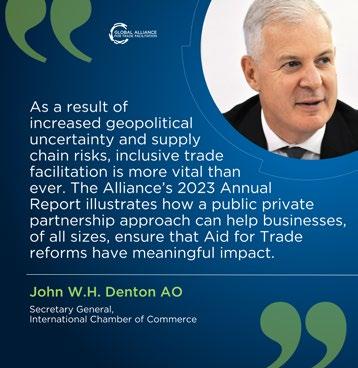
The Global Alliance for Trade Facilitation is a public private partnership for trade-led growth. With the World Trade Organization’s Trade Facilitation Agreement as its roadmap, it supports governments in developing and least developed countries in implementing meaningful reform.
By improving border processes and enhancing supply chain resiliency, Alliance projects improve business conditions and boost trade competitiveness, ultimately fostering inclusive economic growth.
The Alliance is led by the Center for International Private Enterprise, International Chamber of Commerce, and the World Economic Forum in cooperation with Gesellschaft für Internationale Zusammenarbeit (GIZ). It is funded by the governments of the United States, Canada, and Germany.
20
Unlocking borders and empowering growth in the Dutch Agri-food sector with the Global Alliance for Trade Facilitation
In an effort to streamline trade processes and foster inclusive economic growth, the Global Alliance for Trade Facilitation recently organized a workshop om the Netherlands focusing on the agrifood sector. The Alliance, a public-private partnership dedicated to promoting tradeled growth, collaborated with ICC NL and VNO-NCW to address key challenges hindering cross-border trade within the Dutch market.
The workshop, attended by representatives from both the public and private sectors, aimed to identify trade barriers specific to the Netherlands and explore solutions to enhance the flow of goods across borders, particularly to and from developing and least-developed countries (LDCs). By bringing together government officials and businesses as equal partners, the Alliance endeavors to cut through bureaucratic red tape and eliminate costly delays at borders.
One of the central themes of the workshop was the importance of streamlining data flow and reducing reliance on paper documents within Dutch trade processes, which often contribute to inefficiencies. Participants also delved into issues surrounding traceability of goods in the Dutch agrifood supply chain and explored ways to ensure mutual agreement in interpreting trade agreements within the Dutch context. The Alliance’s approach emphasizes collaboration between the public and private sectors, recognizing the critical role of Dutch businesses in identifying trade issues and driving meaningful change within the international trade. While the Alliance receives funding from organizations such as USAID, the Government of Canada, and the German Federal Ministry for Economic Cooperation and Development, it relies on the expertise and insights of Dutch private sector stakeholders to address targeted trade reforms within the Netherlands.
Moving forward, the Alliance plans to engage in individual meetings with Dutch sector representatives to further explore identified challenges and develop tailored solutions specific to the Dutch market. By leveraging the expertise and resources of both the public and private sectors within the Netherlands, the Alliance aims to facilitate smoother trade processes and enhance trade competitiveness, ultimately contributing to inclusive economic growth and poverty reduction.
Reach out for more information or to participate as we work collaboratively to overcome trade barriers and create a more conducive environment for global trade.
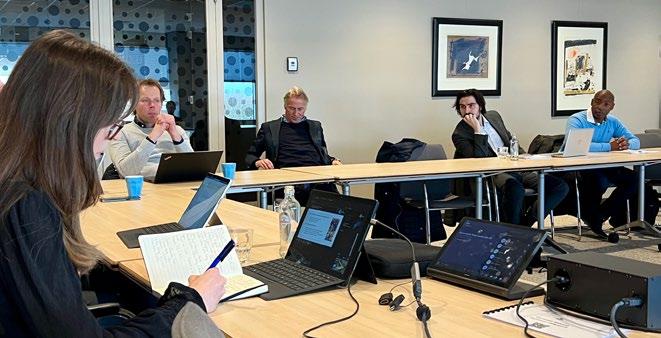

21
Digitalization of Trade

Progress report of the ICC Digital Standards Initiative program in the Netherlands
The goal of ICC’s Digital Standards Initiative is to establish a global, digitized trade environment that benefits exporters, importers, and their service providers, including banks, logistics firms, and solution providers. This report provides updates on the progress made in two of the DSI subprograms.
Legislation
Progress toward harmonizing legal rules by adopting the UNCITRAL Model Law on Electronic Transferable Records (MLETR) is evident in an increasing number of countries, although implementation in the Netherlands is still lacking. The United Kingdom has enacted the MLETR through its Electronic Trade Documents Act of 2023 and in France a proposition for the MLETR legislation has been presented to the French Parliament. For a comprehensive global overview of this initiative, visit https://www.digitalizetrade.org/MLETR
ICC Netherlands advocates for the swift transposition of the MLETR into Dutch legislation, emphasizing its importance in maintaining the competitive position of the international business community in the Netherlands. Given the Netherlands open economy, which includes numerous exporters and importers, failure to adopt the MLETR could lead to a deterioration in competitiveness. To drive this initiative forward, ICC NL has established close ties with UNCITRAL and has begun engaging with the business, the banking sector and trade associations. With the support of a law firm affiliated with ICC NL, efforts are underway to form a coalition of supporters and develop a concrete proposal. This proposal will be presented to the relevant ministries to catalyze the initiation of the legislative process.
Trade Documents and their Data
Trade documents play a pivotal role in international goods, services and financial supply chains, yet they often remain paper-based due to legislative requirements. Recognizing the need for standardization and clarity in this area, the DSI Industry Advisory Board tasked a Working
Group on Trade Documents and Data Elements with reviewing the various documents used for business-to-business (B2B) and/or business-togovernment (B2G) purposes.
The objective of this review was to gain insights into the content of these trade documents and the data standards they employ. Among the 36 documents reviewed, it became evident that while each contains comon core data, these data are often governed by disparate standards. This lack of standardization poses significant challenges, including inefficiencies and operational risks, throughout the end-to-end business processes— from exporters to importers—in both business and financial supply chains.
To address these challenges, the ICC DSI Report on Key Trade Documents and Data Elements is slated for publication in April 2024. The report identifies four foundational factors crucial for driving digitalization in international supply chains:
• Standardization of electronic documentation.
• Legislative and regulatory support, including initiatives such as the adoption of the MLETR.
• Industry convergence and engagement.
• Adoption at scale.
When released, this report will be published on our website and communicated to our members through news updates. We are also looking forward to welcoming representatives from France, Germany, and the UK to discuss a way forward for the implementation of MLETR in the Netherlands in the second quarter of this year.
Interested in getting involved? Send us an email to join the Dutch or international working group on DSI.
Gerard Hartsink Senior Advisor ICC Netherlands
22
UK trade has gone digital. What now for the Netherlands?
Chris Southworth, Secretary General of ICC United Kingdom, discusses the impact of the UK’s new trade laws. “We jumped from 1882 to 2023, seeing massive efficiency gains from day one.”

Marking a seismic change for UK and international trade and finance, the UK parliament passed the Electronic Trade Documents Act (ETDA) on 20 September 2023. This piece of legislation enables documents of title to be handled in digital form, thus aligning English law to the UNCITRAL Model Law on Electronic Transferable Records (MLETR). For those readers needing a quick reminder: MLETR is the global framework for handing documents such as bills of lading and bills of exchange in digital form.
The impact of the ETDA is enormous to UK and world trade. Internationally, 80% of bills of lading, 60% of global trade finance and much of the shipping and marine insurance industries operate under English law.
Whilst much progress has been made to digitalise customs processes, this has not resulted in a paperless trading system. In the EU, only 1-2% of trade documentation is handled in digital form. Removing legal barriers to digitalise documents of title and aligning national laws to MLETR addresses this issue. It enables trade transactions to be digitalised and with it the wider trade ecosystem. “We have all been trading almost exactly the same way for 200 years in which time layer upon of layer of paper documentation and bureaucracy have been added over time. The system is slow, inefficient and costly,” begins Chris Southworth, Secretary General of ICC United Kingdom, referring to the UK Bills of Exchange Act of 1882. “Nobody would design a trade system based on paper in today’s world. It would be digital. With the ETDA, we have effectively jumped from 1882 to 2023, seeing the potential for massive efficiency gains. In the UK, we estimate these to be £25 billion in trade growth, £224 billion in efficiency savings and £1 billion in additional trade finance.”
Keen to broadcast the positive effects of the newly introduced legislation, the ICC United Kingdom published ‘Seizing the Moment: Unleashing the potential of trade digitalisation’, a report that spells out the transformative potential of moving from paper-based to digital documentation. The report’s message is clear: trade digitalisation yields astounding results. To give just a few examples, using the new law reduced shipping costs (down 18%), operation costs (down 30%), border waiting times (down 80%). UK businesses have witnessed a 15% increase in profitability and a 100% removal of logistics paperwork. “We have seen a doubling of trade flow for one SME; transactions now take one hour instead of months. It’s unbelievable,” smiles Chris.
He summarises the opportunities of trade digitalisation: “Data-led trade and faster transactions enable corporate treasuries to better manage and control cash and enhance liquidity, compliance teams are able to reduce risk across global supply chains and improve the quality of ESG reporting.
Trade costs can be dramatically reduced by using technology more effectively and removing all the inefficiency driving greater profitability.”
There is another important advantage of paperless trade that is – at least for the moment – less quantifiable. “If businesses want to recruit young people, there is really an important workforce benefit of going digital. Because what young person wants to work in a sector that uses archaic paperwork systems? So the ETDA is not just about economics and trade; it’s about companies being attractive to the next generation,” says Chris.
Join us for our Round Table discussion on June 19th, featuring a delegation of experts from the United Kingdom, France, and Germany. Together, we will delve into how the Digital Standards Initiative (DSI) is facilitating businesses and financial institutions by advancing the digitalization of all trade-related documents. We’ll also examine why the Netherlands may be lagging behind in this initiative and work towards finding a way forward. Both the private and public sectors are invited to participate in this insightful discussion.
23
The ICC United Kingdom played a key role in reaching last year’s 20 September milestone. But what steps did they actually take to push the progress of the new law? “We started in 2017 by putting together the ‘ICC Digital Trade Roadmap‘, which set out what needed to be done, by whom including legal reform. We then partnered up with government and the Law Commission for England and Wales and created an impartial forum for all the actors in the system to feed into the process. This last point is very important. Trade is complex in the number of stakeholders involved,” explains Chris. “And we didn’t want to overcomplicate matters. We just wanted to unblock the key sticking points of paperless trade, which are the documents of title. This was a conscious decision. This year we will see a new Digital Assets Act come into force which is the next priority, enabling the use of digital currencies and tokenisation of finance. The aim of not overcomplicating the legal aspects worked out well; the ETDA is only one and a half pages long. “In fact, it doesn’t even change the 1882 Bill of Exchange Act or the 1992 Carriage of Goods at Sea Act. It is actually quite simple; the key sentence is that documents of title are recognised in digital form.”
Besides publishing the ‘Seizing the Moment’ report, Chris’ team at the ICC United Kingdom are spreading the message of the benefits of paperless trade. “We are keen to help and support others and are currently working closely with the ASEAN and Commonwealth to remove legal barriers and align laws in these networks too. It’s really important we all work together and ensure no one gets left behind in this exercise. We want to share the knowledge and experience we have because it is absolutely pointless if other people make the same mistakes that we made. Therefore, while it took us in the UK five years to achieve legal reform, we think that it is actually possible to do it in 18 months. Across 56 Commonwealth nations, we are aiming to remove all legal barriers and fill legal gaps in key areas such as e-payments, e-signatures and e-contracts by October 2026. It’s enormously ambitious and never been done before but we are feeling bullish.”
There is a lot of momentum around this agenda now. France, Germany, Japan and Thailand are all expected to be aligned to MLETR this year and China, Georgia, Turkey and Morocco are all working on reforms. Singapore, UAE (Abu Dhabi Global Markets) and the UK all now have fully interoperable legal environments enabling digitalised trade to flow across the maritime silk route from Europe to Asia. A quick look at the ICC MLETR Tracker will show you the current status of adoption of MLETR- aligned legal reform around the world.
The status of the Netherlands is (sadly) ‘No Progress’ although consultations are underway to enable electronic bills of lading which is a positive step forward. What does Chris have to say about this? “The Netherlands has a similar make up to the UK being a large finance, tech and trade hub and services economy. Our advice to all countries is to implement MLETR in full. If only bills of lading are electronic the law won’t enable digital finance to integrate so that finance and goods transact in real time at the same time which we are already starting to see and will be how we all trade in the future. This is an incredible opportunity to remove a whole swath of real friction which companies always complain about. For UK business, the whole trade environment changed on 20 September – we can now trade cheaper, faster and simpler than we could ever do before.”
The ICC’s work – and in particular the Digital Standards Initiative – is playing a vital role in coordinating the digitalisation of global trade. “Part of the problem with global trade is that it is so fragmented, there are so many different stakeholders. Therefore, it is difficult to get everybody mobilised around a common goal,” says Chris. The ICC’s focal point is a goal of global digitalised trade by 2026, about which he is optimistic. “What the ICC is working on in terms of digitalisation is groundbreaking. This is an exciting time; momentum is definitely building. We are on the cusp of a radical change in the way that we trade globally.”
Rocket boosters for digitalisation
Did you know that 80 to 90 per cent of all international trade transactions are underwritten using Singaporean, American or UK law? And now that the UK has passed the Electronic Trade Documents Act, all three countries are now digitally enabled, all aligned with the Electronic Transferable Records model (Singapore ratified its own laws in 2021 and the USA uses the Delaware Uniform Commercial Code). “One of the big problems with digitalisation of trade documents was scale,” says ICC UK Secretary General Chris Southworth. “But the last big piece of the puzzle dropped into place on 20 September 2023. The reaction from the market has been extraordinary; this really puts rocket boosters on the digitalisation agenda.”
Read ICC UK’s full ‘Seizing the Moment: Unleashing the potential of trade digitalisation’ report here
24

Digital Conference and Awards!
What is C4DTI DTC?
The Digital Trade Conference (DTC) is the annual, international, flagship event for ICC Centre for Digital Trade and Innovation (C4DTI).
Taking place on 17–18 April 2024, it will discuss practical implementation, results from recent pilot initiatives and ongoing roll-outs:
• How we can implement interoperable systems across border with government and industry, drawing on international best practice;
• Implementing international legal, rules and standards frameworks consistently across global supply chains;
• Best practice solutions, lessons learnt from pilot initiatives and access to the international experts and thought leaders leading projects and programmes;
• Practical solutions to managing key risks across global supply chains – data security, cybersecurity, and fraud;
• Insights and thought leadership.
Come join us at our annual C4DTI Digital Trade Conference where we will be focusing on the practical benefits of digitalising the trade ecosystem and discussing the “HOW” & with “WHAT RESULT”.
Agenda
Day 1 – Virtual
Wednesday 17 April (free of charges)
• State of play & fundamentals of digital trade
• How do SMEs digitalise their trade processes?
Day 2 – In-person, London
Thursday 18 April
• Accelerating the implementation of digital trade Don’t miss the annual C4DTI
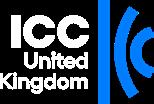

www.c4dti.co.uk/ digital-trade-conference/
25

Week of Integrity 2024
We are thrilled to announce the upcoming edition of the Week of Integrity, where we will delve into the crucial theme of Integrity in ESG (Environmental, Social, and Governance) communication. Set your compass to ethical sustainability as we navigate through the intricacies of genuine commitment and steer clear of the pitfalls of greenwashing.
In our quest for the perfect theme, we’ve narrowed down our options to these finalists.
Help us choose the most fitting name for this edition:
• Integrity & Transparency: For an Authentic Sustainable Commitment
• Building Sustainable Trust: Integrity in Sustainability Reporting
• Integrity is to be Green but also Clean
• Act with Integrity and Wash Greenwashing Away
• Green Honesty Takes Ethical Courage
This year’s edition will be happening from the 9th to the 13th of December 2024
Throughout the year, we remain committed to fostering integrity in every aspect of our endeavors.
Join us in a series of free events aimed at promoting integrity and sharing valuable insights and ideas to prepare you for the Week of Integrity.
For more details about the Week of Integrity and to stay updated on our events, visit www.weekofintegrity.org
We look forward to your participation!

26
Events in Q1
Diversity of Thinking and Employee Voice with Rabobank
See next page.
Celebrating International Women’s Day
The discussion forum, “Diversity in Compliance,” brought together an array of inspiring women from diverse backgrounds and organizations. It served as a platform to delve into crucial topics, exchange ideas, and pave the way for a more inclusive future.

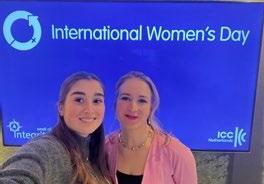
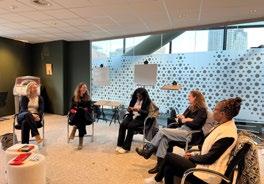
Upcoming events
DSI invites you to explore the following questions together during our next partner meeting
• How can organizations defend themselves against accusations of greenwashing?
• Are transparency and direct policy actions sufficient to effectively tackle greenwashing?
• What role do the CEOs and Boards of Directors play in the pursuit of a sustainable economy? How can we communicate constructively about this within our organizations?
• And, currently, how do we view the anti-ESG trend emerging from America?
Guiding ethical decisions through Nature Intelligence
We explored how ethical decisionmaking can be improved when we connect with “Nature Intelligence”.
What happens when we include the voice of Nature Intelligence in our ethical considerations? When we take natural principles as a starting point.



27
Sign up here!
Talking Diversity of Thinking and Employee Voice with Rabobank
Marjo van den Broek and Manon de Zwart from (long-time ICC member) Rabobank recently held a workshop at the ICC offices about the twin subjects of ‘Diversity of Thinking’ and ‘Employee Voice’. The aim was to give attendees the skills to deal with moral dilemmas more confidently as well as methods to stimulate and engage employees’ voices. Keen to learn more about these two interesting subjects, we caught up with Marjo and Manon to find out more.

Can we start by asking for a definition of ‘Diversity of Thinking’?
Marjo: We see ‘Diversity of Thinking’ in how different people look at the same thing in different ways. For example, if I draw a number eight on the ground, some people would see a number 8, some people may say it is an infinity sign. Some people might say it was a pretzel and some say it is just a figure. This is what ‘Diversity of Thought’ is about.
How does this translate to company processes?
Manon: It is applicable for everything. You need to have the right information in order to make the right decision. You can only do that if the people on the work floor share the crucial information to the top. It’s about creating space where employees can speak their minds at all levels in an organisation. However, this unfortunately doesn’t happen in every organisation. Look at recent examples like the issues at NPO and “TheVoice”.
Ah yes, so this is the ‘Employee Voice’.
Marjo: Indeed – only if you know all the different perspectives, can you see all the opportunities and the risks. You have to look at the pros and cons of a decision, and whether there are guidelines or laws that can help. But laws do not solve everything – that’s why ‘Diversity of Thinking’ and ‘Employee Voice’ are so important.
Can we look at how these two subjects are linked to the broader issue of Integrity? What does Integrity mean to Rabobank?


Marjo: We collaborate to add value to our clients to contribute to societal challenges. To this end, empowered colleagues build trust; they address each other on unethical behaviour and signal possibilities to improve things. This is fundamental to our bank.
Manon: For us as a company, trust is of the essence. You cannot be trusted if there’s no integrity in your organisation. Without trust, a bank would not exist; people trust us to keep their money safe and to do the right thing. And therefore integrity for us is key – it is paramount to the success of banks and we should do what is necessary to safeguard this trust.
Rabobank operates in 37 countries. How does it implement this way of thinking throughout its operations?
Manon: It’s important to note that topics evolve over time; the sentiment in the market also evolves over time. Therefore it is vital to keep the dialogue going. And because things differ in different countries, we have to stay in dialogue with our own people, our own organisation and our stakeholders about what is ethical. However, what we think is the right decision today is maybe not the right decision when
Marjo van den Broek, Business Manager Financial Crime Compliance & Founder of the global Rabobank Speak Up initiative
28
Manon de Zwart , Strategic Communications Advisor

looked at 10 years later. This makes it a very difficult subject, but getting back to the idea of Diversity of Thought – where you have to have all the views in order to make the right decision – for us as a cooperative company, what matters to society, matters to us. So we listen to our stakeholders to make the right decisions.
Do companies still encounter dilemmas even if they have all the right decision making tools – such as ethics committees, employee voice initiatives, stakeholder meetings – in place?
Marjo: Even with all these initiatives, there can still be real dilemmas. Marijuana in the United States, for example; in some States, it is legal and in others it is illegal. Solar panels are sustainable, but what if they are produced in countries where there are human rights issues? Air guns are used in the Olympic Games, but criminals can also use them in robberies. Because subjects change every day, you cannot really know the future of integrity – it is always going to be led by society.
Manon: Besides maintaining the dialogue with society stakeholders, it is therefore crucial to ‘walk the talk’; to do what you say and be authentic. We all want to do the right thing, but we don’t know how something will be perceived in 10 to 20 years. So all we can do is the right thing with the information that we have right now.
During an enriching workshop, that brought together over 40 participants, Marjo van den Broek and Manon de Zwart shared invaluable insights drawn from their extensive experience at Rabobank on amplifying the voices of employees. Through engaging practical exercises, we delved into the art of both speaking up and actively listening.
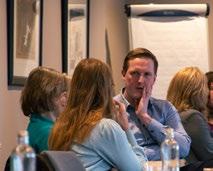
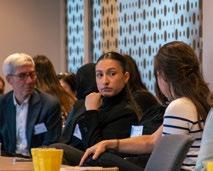
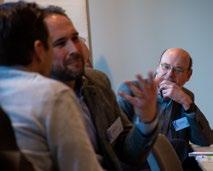



29

12
The Hague, The Netherlands
Bezuidenhoutseweg
2594AV,
www.iccwbo.nl info@icc.nl


















































